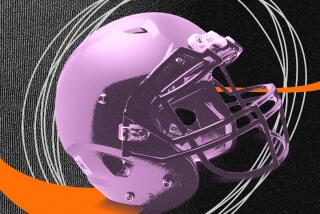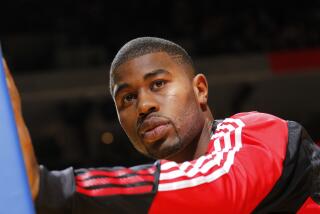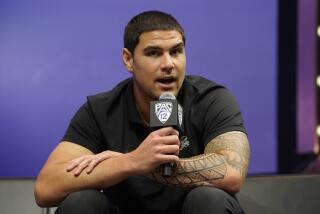Mistrial Declared for Tulane’s Williams : Prosecution Is Dealt Setback in Basketball Point-Shaving Case
- Share via
NEW ORLEANS — The point-shaving trial of Tulane’s John (Hot Rod) Williams ended abruptly in a mistrial Tuesday with the revelation that his defense attorneys had never been allowed to see the videotaped confession of a fellow player.
Jon Johnson, a Tulane forward, mentioned during his testimony that he had given a statement to prosecutors in March when he agreed to testify against his teammates on the promise he would not be charged in the scandal.
Defense attorney Michael Green said he had never been given the tape, and Criminal District Judge Alvin Oser did not disguise his fury.
He summoned Asst. District Atty. Eric Dubelier to the bench and told him, “You, sir, have caused a mistrial in this case.”
Oser, a former prosecutor, said he had “never seen anything like this” in his 26-year career, then stalked out of the courtroom.
Williams would not comment on the development.
Green later asked that all charges against the 6-foot 10-inch center be dismissed on grounds of prosecutorial misconduct. If Oser refuses, Williams would likely be retried on the two counts of sports bribery and three counts of conspiracy.
Prosecutors protested that there was nothing in the tape that could help Williams’ defense anyway, but Oser told them that the rules of evidence had been clearly established before the trial began Monday.
“It’s a violation of the order of this court,” he told prosecutors. “You have prepared this case. You should know what’s in your files.”
The move came after the second day of incriminating testimony against the NBA draftee, who has been described by Green as a poor country boy duped into the gambling scheme by wealthy fraternity brothers trying to support their cocaine habits.
Clyde Eads, a former player who like Johnson was granted immunity, testified that the point-shaving in the Feb. 20 game against Memphis State was so blatant that players shouted at each other from the bench to miss points.
Gary Kranz of New Rochelle, N.Y., the student who masterminded the point-shaving scheme, testified that Williams willingly agreed to cool his hot shooting in return for thousands of dollars.
“John Williams told me they had broken into his car, stolen his radio and he really needed the money,” Kranz said. “His (mother’s) house had burned down, and Tulane didn’t give a damn.”
Williams, 23, was the first of nine suspects to stand trial in the scandal that prompted Tulane officials to drop the men’s basketball program. Four of the suspects, including Kranz, have already pleaded guilty in plea bargain arrangements in exchange for their testimony.
A videotaped statement from Williams was to be played later in the trial, but the existence of a taped statement from Johnson had not been known to the public--or, apparently, to the defense attorneys.
“I think Mr. Green’s client’s rights have been violated by the state,” the judge said.
More to Read
Go beyond the scoreboard
Get the latest on L.A.'s teams in the daily Sports Report newsletter.
You may occasionally receive promotional content from the Los Angeles Times.










